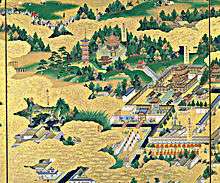Taitoku-in Mausoleum
.jpg)
The Taitoku-in Mausoleum (台徳院霊廟, Taitokuin Reibyō) was an Edo period mausoleum for Shogun Tokugawa Hidetada. It was located within the grounds of Zōjō-ji in Tokyo.
The architecture of the mausoleum was sumptuous. It was largely destroyed in the aerial bombardments of World War II.
History

.jpg)
The mausoleum was constructed for Tokugawa Hidetada, who died in 1632. His buddhist posthumous name is Taitoku-in.[1] The location was in the southern part of Zojo-ji. The main construction took around six months and was made largely with wood.
The complex with its 15 structures was listed as a National Treasure in May 1930. The Tokyo air raids of May 1945 destroyed most of the structures. The ashes of the shogun were reburied in 1958.
Architecture
The complex consisted of various gates leading into the inner sanctuary where two main buildings and a pagoda stood. Of these, only four buildings survived the war, with damages. Three of these structes were moved to Tokorozawa, Saitama Prefecture in the 1960. The So-mon gate was moved 45 metres to the east of the original location in 1959, to make space for a hotel.
A large miniature model of the main two halls was commissioned by the city of Tokyo for the 1910 Japan–British Exhibition in London. It was given as a gift to King George V and was later displayed at the Royal Botanical Gardens in Kew. It was restored in 2015 and returned to Japan to be shown at a special exhibition at the Zojo-ji.[2][3]
See also
- Kunōzan Tōshō-gū and Nikkō Tōshō-gū
- Kan'ei-ji in Tokyo, site of several Tokugawa mausolea
- Mount Kōya, site of several Tokukagawa mausolea
References
Further readings
- W.H. Coaldrake. The Mystery of the Meiji model of the Shogun's Mausoleum. Orientations 37:4, 2006.